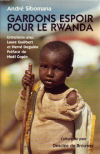Tribunales internacionales para el juicio de los criminales

Gardons espoir pour le Rwanda, par André Sibomana
A travers une série d’entretiens réalisés peu avant sa mort par l’historienne Laure Guilbert et le journaliste Hervé Deguine, André Sibomana nous livre son témoignage du génocide rwandais mais également son analyse de la situation et des clefs de lecture pour tenter de comprendre comment un tel déchaînement de violence a pu se produire.
Nathalie Cooren, Paris, septiembre 2013
-
Promotion de la justice et application des accords de paix
Les mécanismes alternatifs de résolution des conflits apportent des solutions qui complètent le travail des Etats en matière de justice et enrichissent les perspectives de construction de la paix. Au niveau international, des mécanismes juridiques se développent pour assurer le respect du droit international humanitaire.
Mathieu Routier, Paris, marzo 2009
-
Better Late Than Never: Enhancing the Accountability of International Institutions in Kosovo
Koso: whic status?
Paris, noviembre 2007
-
Unfinished Business - Serbia War Crimes Chamber
The armed conflicts in the former Yugoslavia during the 1990s were marked by extensive violations of human rights and international humanitarian law. To ensure some measure of accountability for the widespread killings, rapes, destruction of property, and massive displacement of people, the United Nations established the International Criminal Tribunal for the former Yugoslavia (ICTY).
Paris, noviembre 2007
-
Weighing the Eviden Lessons from the Slobodan Milosevic Trial
Although Milosevic’s death—and the absence of a verdict—denied the victims a final judgment, this should not diminish the trial’s other accomplishments. As the first former president brought before an international criminal tribunal, the trial of Milosevic marked the end of the era when being a head of state meant immunity from prosecution
Paris, noviembre 2007
-
Cambodge, le contraire d’une « tragédie sans importance » (1)
Richard Pétris, Grenoble, France, marzo 2006



